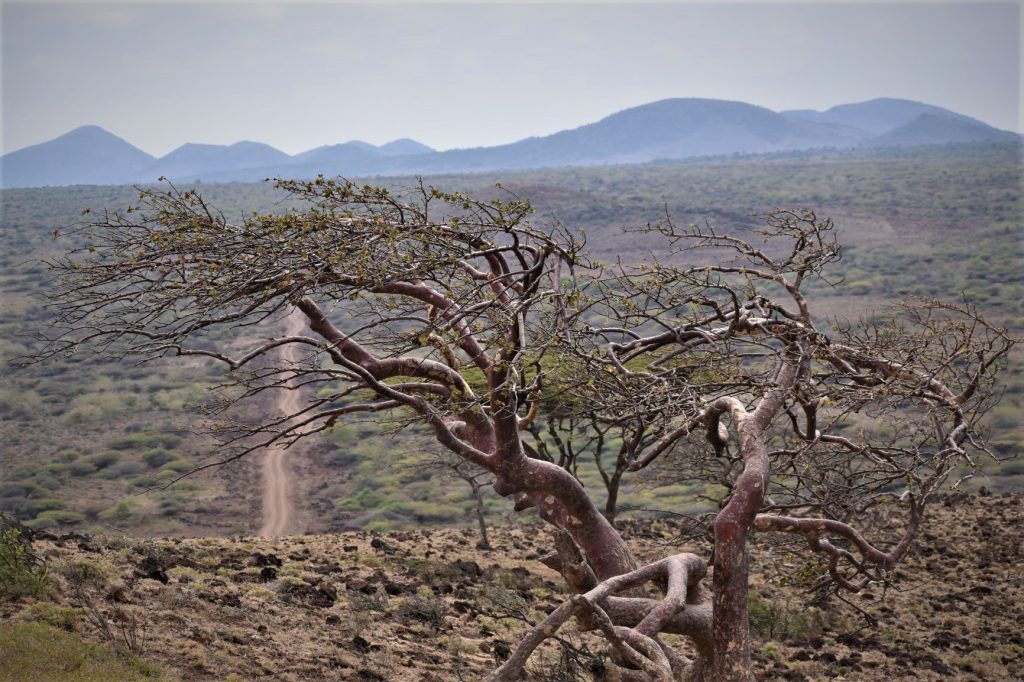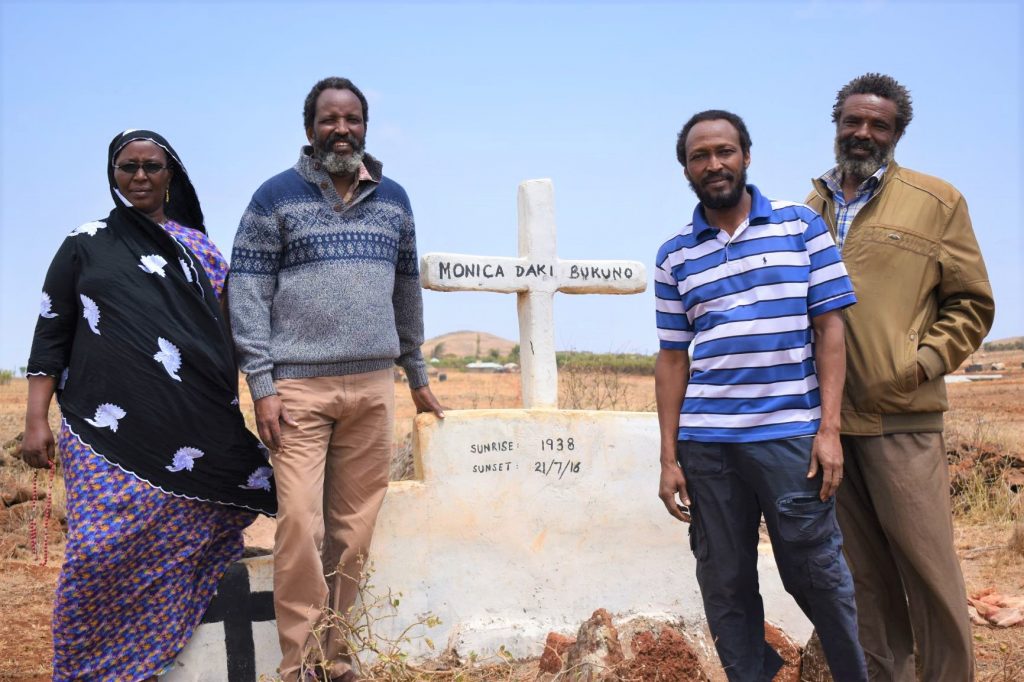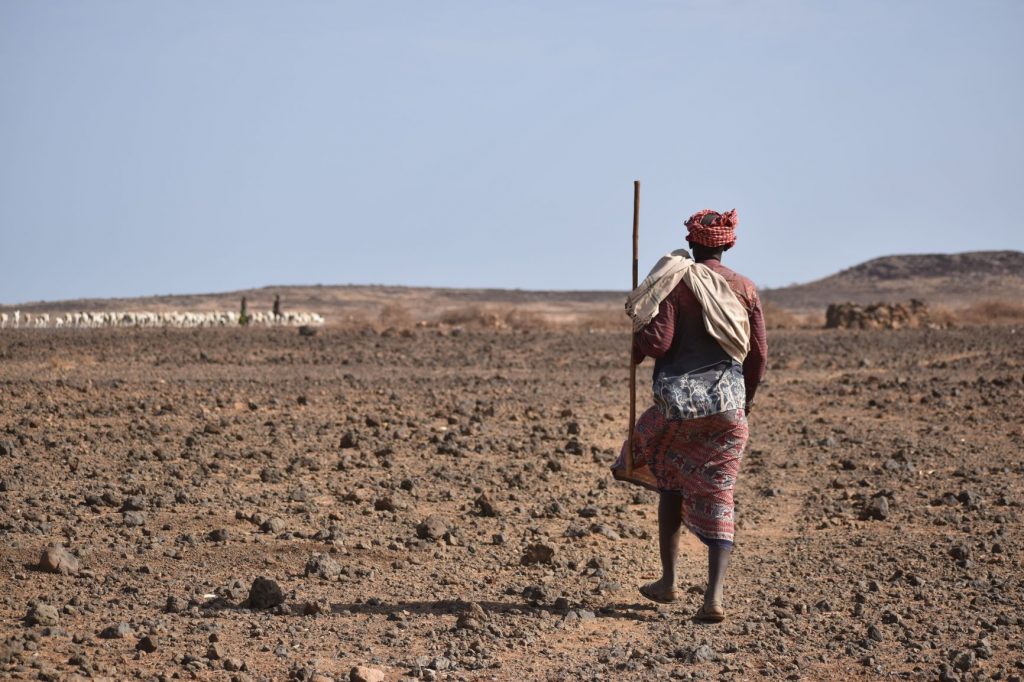Hurri Hills is a small village on top of a windswept mountain in northern Kenya. The cool climate contrasts with the vast Chalbi desert that surrounds this highland village. A mere shell of its dynamic past as the bread basket for the northern region of Marsabit County, the village is now a sleepy hub for Gabra pastoralists. Fifteen years of inconsistent and insufficient rains have changed the economy of the town and left its mountaintop residents parched.

Nonetheless, this isn’t a story of how Global Warming has changed the economy and lifestyles of the people of Marsabit, nor is it a story that mimics the sleepy nature of this town. Instead, this is a brief account of the leader of Children Peace Initiative Kenya, Hilary Bukuno, and some of the events that helped him conceive of the children-centric methodology.
I will start with my arrival to Hurri Hills. While I have had the opportunity to learn about Hilary and his passion during my Peace Fellowship, being invited to his home village helped me contextualize the person and the philosophy. I came to Hurri Hills as a guest of Mr. Bukuno while he made the pilgrimage to visit the grave of his mother, nearly three years following her death. As per tradition, he asked a priest to give a mass in remembrance of his mother and purchased a goat and sheep to feed the family and friends who would attend.
Under an aura of tradition and remembrance, we marched up to the grave site. The grave was covered in the belongings of his mother and portions of her traditional wedding house. We all gave libations of tobacco and salt while standing for prayers.

From the burial site another mountain was visible to the northeast. Hilary pointed it out to me and told me that 14 years ago a horrible massacre occurred there. At the height of interethnic tensions, 60 people were murdered in the village of Turbi. The tragic event that displaced thousands of people from northern Marsabit county and directly affected Hilary. As Hilary recounted to me, he had family and friends who narrowly managed to escape the deadly raid.
Instead of becoming a partisan in the conflict between people of Borana and Gabra communities, the conflict strengthened his resolve to bring peace. From early on, Hilary saw ethnic tensions as “the result of continued marginalization of communities in northern Kenya”. And, his mission was to unite the peoples in conflict in order to address this historical marginalization.
He began this mission a year before the violent raid in Turbi. In 2004, as the Bishop-appointed Coordinator of Justice and Peace for Marsabit Dioses, he facilitated the Walk for the Road, a 534-kilometer march from the border of Kenya and Ethiopia to Isiolo town. The rough road required any vehicle to budget nearly two days for travel and was fought with danger as bandits capitalized on the poor road conditions to rob those passing by. The protest was accompanied by 77 residents of Marsabit, a seventh of whom were women. Aggressive publicity of this march forced the national government to act quickly, leading to a tarmacked road that reduced travel time to mere hours.
The success of this campaign only highlights the pride Hilary has for the land he is from. However, violent events, like those in Turbi, as well as the continued failures of peace accords within the region led him to follow a different direction. His passion for northern Kenya was tied intrinsically to children. As he recounted, “I received my degree in education, founded many youth groups, and felt that sensitizing the future generations was the best pathway to meaningful peace and development of the region”.
The violence in Marsabit is caused by a confluence of factors, from diminishing water and extreme poverty to the proximity of an international border and opportunistic politicians. The complexity of the conflict in this region of the country means that accords and agreements between powerbrokers are bound to fail without the buy-in of their constituencies. Additionally, as water has become increasingly scarce and poverty has intensified, the conflict can be seen as both a result and a cause to economic development.

Hilary has felt the hopelessness and intricacy of the problem before him. Despite his professional leanings towards education, he has made efforts to address all components of this problem. His peace initiatives have spanned from advocacy for economic inclusion to changing the norms of violence. Nonetheless, the latter is where he has seen the most success.
Children Peace Initiative Kenya began where Hilary had the most experience. According to CPI Kenya’s 2013 Annual Narrative Report, “Traditionally, [the] agenda for inter-community peace and dialogue was reserved for few opinion leaders and government officials”. Instead, Hilary has focused his programs in Marsabit on bringing families together by using children as a common link. This has worked to break down stereotypes that perpetuate animosities and pressure leaders into respecting signed agreements. With successes in diverse villages across Marsabit, from Maikona to Loiyangalani, Hilary quickly expanded operations to Baringo, Samburu, and Isiolo.
Despite the marked success of a child-centric peace initiative, migration and worsening drought make the conflict regions especially dynamic. In Marsabit, interethnic violence has once again spiked. From the violent death of Chief George Biqa – a Borana chief and close associate of Hilary who was murdered for supporting a peace process – to recent politically motivated attacks on disparate villages, Children Peace Initiative must face complex challenges in order to further its mission. As these complex challenges affect the region, they also affect Hilary. CPI’s success in the county will provide the groundwork for economic development and a prosperous future. And, without the success of CPI’s programs in Marsabit, the safety and livelihoods of friends and family hang in the balance.
To support Hilary and his organization, Children Peace Initiative Kenya, please visit the website and donate to the ongoing Zivik supported program in Baragoi.
Posted By Benjamin Johnson (Kenya)
Posted Jul 29th, 2019


4 Comments
rachel wright
July 29, 2019
Loved this blog and the context it provides to the peace camp you are working with. I’ve looked forward to reading the stories of those you are working with all summer!
Sam Nass
July 29, 2019
Great blog! Really inspiring story and really interesting commentary on the roots of Hilary’s work.
Abby Lahvis
July 30, 2019
I loved this profile on the founder! Such an interesting and inspiring story. The pictures that went along with this story were also breathtaking.
Iain Guest
August 11, 2019
So good to get a sense of Hilary’s own background and story! His personal experience gives him motivation and credibility – which are you rarely find in NGOs that work in the towns. This is why CBOs like CPIK are such important agents of change. So glad that you were able to make this long trip.